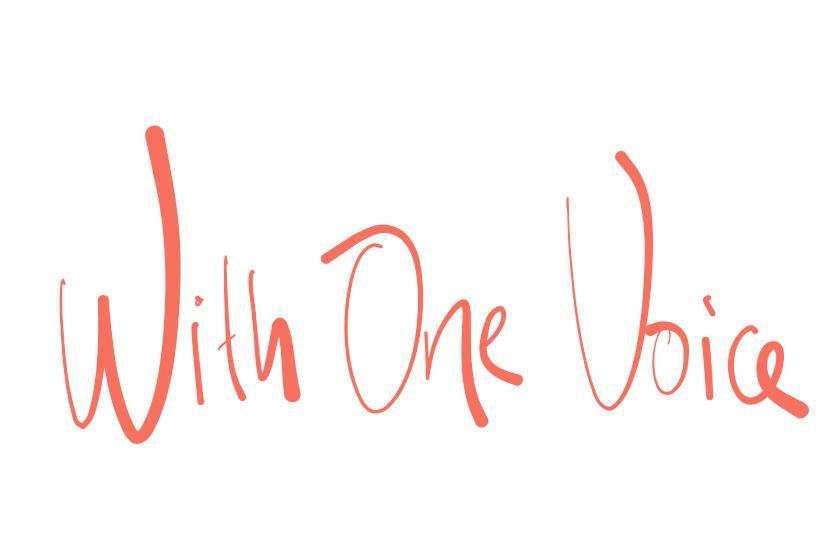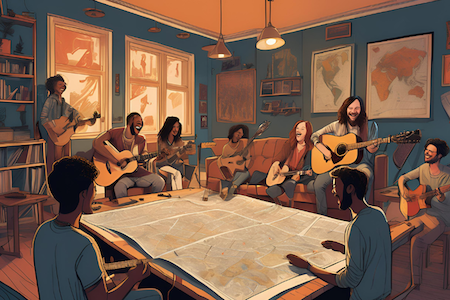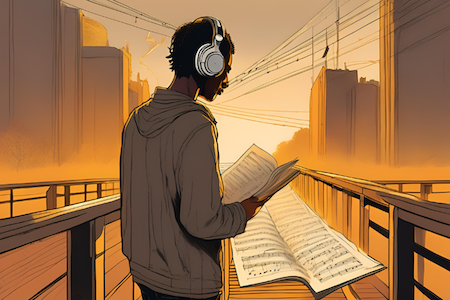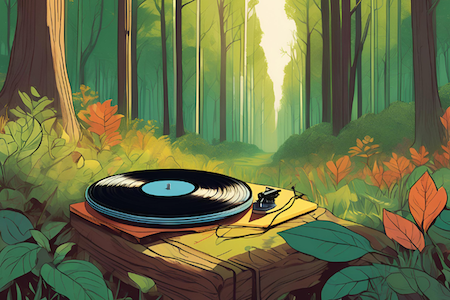
With One Voice - April 2025
Available in English, French, Spanish, and Portuguese
What is CLIP and how can it bridge the gap between making music and making money? CLIP Champion Solange Cesarovna dives into the details in this month's With One Voice. ExCo member Thando Nyameni reflects on the need for IP literacy for music creators across Africa to truly benefit from the region's boom. Finally, a reflection on physical media's constantly evolving revival.

CLIP - Creators Learn Intellectual Property - The Free Online WIPO Platform That Gives You Clarity on How to Get Credited and Paid for Your Music
“As musicians, singers, and songwriters, we love what we do. But how can we ensure we are properly credited and fairly paid? Understanding our rights can make the difference between simply making music and making a living from it.” – CLIP (goclip.org)
That’s why I’m so passionate about CLIP – Creators Learn Intellectual Property. As a CLIP Champion for Portuguese-speaking countries, I see firsthand how access to knowledge can transform creators’ lives.
Creators have rights, but we also have responsibilities—to be proactive, professional, and committed to managing our intellectual property, just as we are committed to making great music.
Many talented creators struggle to navigate the complexities of the music ecosystem and industry, often missing out on the financial and legal benefits they deserve—CLIP equips us with the knowledge to protect our work and build sustainable careers.
Managed by the World Intellectual Property Organization (WIPO), CLIP is a free, 24/7 online resource that makes the music ecosystem easier to understand. It explains our rights and responsibilities and offers practical guidance to help us make informed career decisions. With CLIP, creators worldwide can learn how to get credited and paid for the music they create. The platform is already available in seven languages—English, French, Chinese, Spanish, Russian, Arabic, and Portuguese—and more are on the way.
One of the most inspiring aspects of CLIP is that it features creators speaking to their peers—sharing knowledge and experiences in a way that makes even complex topics accessible. From identifier codes to standard contracts, CLIP is designed by and for creators and artists. It even includes a wonderful and very complete glossary to help us better navigate the industry.
Additionally, CLIP is backed by a strong advisory board representing major organizations—including CIAM—that shape the music ecosystem and copyright frameworks worldwide. This ensures the platform remains a reliable, up-to-date resource that truly serves the needs of creators worldwide.
I am incredibly proud to champion this initiative. Because when we understand our rights, we unlock our power—not just to survive, but to thrive.
CLIP is more than a program—it’s movement for fairness, for empowerment, for creative freedom.
So if you're a music creator I invite you to Go CLIP.
Because your music and your art matters.
Visit goclip.org and start your journey today. The future is yours—own it.
Solange Cesarovna - Songwriter, CIAM Vice President and African Music Academy Representative

Africa’s Musical Rise: Who Truly Benefits? A Reflection Ahead of World IP Day
The IFPI's Global Music Report 2024 has once again confirmed a remarkable trend: Africa is the fastest-growing music market in the world. As stated by the IFPI, "Sub-Saharan Africa saw the highest regional growth in 2023, rising by 24.7%, driven largely by significant increases in paid streaming revenues." South Africa remains the continent’s largest recorded music market, accounting for nearly 77% of SSA’s revenues (IFPI, 2024).
While this report should ignite celebration, it also raises a sobering question—who truly benefits from this exponential growth? As someone who has spent years engaging with African music creators on the ground, I can confidently say that many are yet to benefit from this booming market due to limited understanding and ownership of intellectual property (IP), especially from publishing and sound recording perspectives.
Even as Afrobeat, AmaPiano, and other African indigenous such as South Africa’s Maskandi, Isicathamiya and overall folklore sounds of the continent reverberate across international stages, many African creators continue to sign away their rights—often unknowingly—to global players headquartered far from our shores. This undermines the economic empowerment of creators on the very continent where the creativity originates.
As I prepare to join fellow music creators at the CISAC General Assembly in Sofia, Bulgaria, I do so with deep reflection. Since CIAM’s inception in 1966, I am honoured to be its very first African EXCO member. This moment feels timely. Africa's musical voice is louder than ever—but its creators still lack access to the economic gains their art generates.
This is precisely why World IP Day is not just symbolic, but a call to action. It reminds us that without IP literacy, creators are vulnerable. While streaming platforms, sync deals, and cross-border collaborations flourish, we must ask: are African creators just voices in the room, or owners at the table?
The contentious South African Copyright Amendment Bill adds further complexity. Provisions like Fair Use, if misunderstood or unchecked, could have devastating consequences for local creators. If more music creators understood the gravity of copyright and the long-term implications of poor legislation, they would rally in thousands to ensure that laws passed in their names do not sabotage their futures.
Enter organisations like CIAM, MCSA, KUMISA, and others. Their advocacy, education, and support are indispensable in bridging the knowledge gap and ensuring creators don’t equate fame with success. Fame without fair compensation is exploitation by another name.
The dawn of AI further complicates the creative economy. While it offers exciting tools for creation, it also raises urgent questions about authorship, ownership, and fair remuneration. CIAM’s role—alongside regional organisations—is now more critical than ever in guiding policy, building awareness, and establishing safeguards in this evolving landscape.
For Africa to truly benefit from its booming music market, we need a united ecosystem: governments crafting supportive policy, CMOs enforcing transparency, educational institutions embedding IP into curricula, and creators themselves demanding more. The music business must no longer be viewed as fringe entertainment—it is an economic engine.
Let us not wait for another IFPI report to tell us what we already know. The growth is real. The talent is abundant. Now, let us ensure the rewards follow suit—for every music creator, across every village, township, and city on this vibrant continent.
Thando Nyameni – CIAM ExCo Member, Chairperson of Music Creators South Africa (MCSA), MD of KUMISA, Music Business Lecturer, Music Business Consultant, Durban, South Africa

Physical media finds a way
When people are exposed to the same message over time, perceptions can get warped. Is streaming the only way to experience music? No, but it feels that way, doesn’t it? Sometimes the value of stopping to smell the flowers allows you to bring perceptions back to reality. In this sense, stop, look around you, and realize physical music and media are finding their way much like nature returning after a wildfire.
The pendulum swung heavily the past two decades towards intangible digital media formats. Yet in America, last year’s revival, feel-good story has been the return of…physical books. Barnes & Noble opened 57 new locations in 2024 while other retailers shuttered. With a competitor that is the Goliath of Amazon, the bookstore found its way through (human) curation for the local community. Straight lines were replaced by a labyrinth to discover books, music, film, and television series. Events are frequent. Perusing is encouraged. It is the opposite of the click-to-immediately-consume (convenience?) of digital or streaming. In a country known for tech giants, a good old-fashioned bookstore has long lines at the register to check out and people plunged into that sweet smell of book pages.
While we know vinyl has had a resurgence, vinyl bars are proliferating globally now. Originating from Japan, the most recent iteration is a space to socialize, drink quality concoctions, and enjoy curated music-an elevated listening room. Digital is stuck standing outside looking in the windows at everyone enjoying music as it is meant to be enjoyed-on vinyl. Austin, Texas’ VINYL Beauty Bar pushes this further by combining locally curated records for sale, DJs, a stage, cocktails, and a beauty salon.
This phenomenon of physical finding its way is taking hold globally in other ways. Paris’ Book Nook combines an independent publisher with a coffee shop. You can have a latte and pastry while perusing their latest works. It’s all about the local, community, and physical interaction taking priority over technology. Become human again.
New, innovative experiences embracing physical music and media have emerged from the flood that was digital and streaming. Perhaps these are responses to the social isolation effects of the pandemic or the rejection of robot algorithms telling you what to listen to. Increasingly, more and more places are emerging to pull you out of your smartphone, tablet, and streaming platform and plunge you back into community and creativity. This spring, stop and smell the vinyl.
